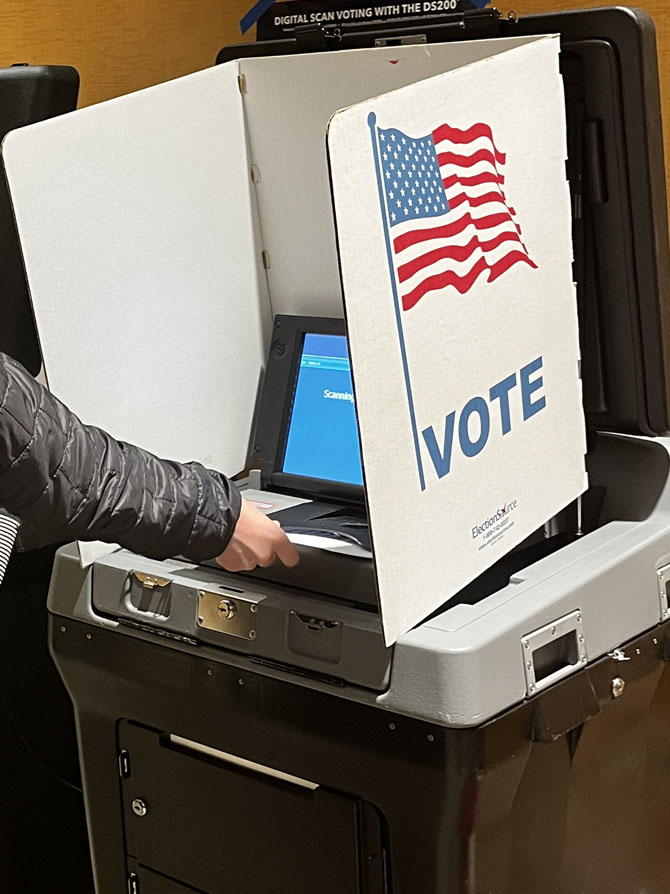Energy and Climate: Establishing a Clean Energy Innovation Bank Senate Bill 729 – Sen. Scott Surovell (D-Fairfax) Virginia LCV Position: Support; Youngkin vetoed this legislation which would have provided over 10X matches to state investment for a broad range of projects from solar on schools and electric school buses to upgraded transmission lines and climate resilience. Photo by Mercia Hobson.

Photo by Mercia Hobson/The Connection
Good Governance: Ensuring Accurate Voter Registration and Records House Bill 1177 – Del. Mark Sickles (D-Fairfax Senate Bill 606 – Sen. Schuyler VanValkenburg (D-Henrico) Virginia LCV Position: Support
Michael Town, executive director of the Virginia LCV, reported in the organization’s 2024 Conservation Scorecard that he saw Governor Youngkin "stack an environmental justice board with a litany of fossil fuel lobbyists and polluters after killing related legislation, forcing him to fill long-open board vacancies and send hundreds of millions of dollars of clean energy investments to other states.”
Town said that Virginia LCV will expand its advocacy work by publishing a second, stand-alone Gubernatorial Scorecard scheduled for release this fall. “This scorecard will shine a comprehensive spotlight on Youngkin’s environmental record,” he said.
Virginia LCV Position Support; Gov. Youngkin signed into law.
• Energy & Climate: SB 253 (Surovell)/HB106 (Sullivan), Expanding Shared Solar Programs.
• The legislation improves and expands shared solar access in Dominion Energy‘s territory. The system targets residential consumers, including renters and those with extensive tree cover who lack access to rooftop panels. Midscale solar installations power the system, larger than single-family units but smaller than utility-scale initiatives. SB 253/HB106 raises the Dominion Energy program's capacity to 150 megawatts, allowing certain projects on rooftops, brownfields, landfills, or dual-use agricultural facilities to be eligible for incentives determined by the Virginia Department of Energy. The bill mandates that the State Corporation Commission recalculate the minimal bill assessed to program subscribers to cover the costs of distribution and transmission services. [There is a companion bill, SB 255 (Surovell) and HB108 (Sullivan), New Shared Solar Program in Appalachian Power’s (APCo) Territory.] With much effort to balance the interests of legislators, advocates, and key stakeholders, the bills passed by narrow bipartisan margins, and Governor Youngkin signed them into law.
• Water Quality: HB985 (Tran), High polycyclic aromatic hydrocarbon; prohibits pavement sealants that contain, civil penalty.
• The law prohibits the sale of pavement sealants that contain a high concentration of toxic polycyclic aromatic hydrocarbons (PAHs). HB985 protects water quality from chemicals such as cyanide and coal tar in pavement sealants applied to driveways, parking lots, and playgrounds. The United States Geological Survey (USGS) estimated that the cancer risk for individuals adjacent to coal-tar-sealed pavement was 38 times greater than those adjacent to unsealed pavement, according to the 2024 Conservation Scorecard. The 2024 Conservation Scorecard states, “Following an extensive multi-year effort by Delegate Tran and water quality advocates, HB 85 passed the House of Delegates on a bipartisan 78-21 vote.” Governor Youngkin signed the legislation into law after it narrowly cleared the Senate 23-15, with Republican Senators Stuart and Suetterlein joining Senate Democrats in support.
Virginia LCV Position Oppose; Gov. Youngkin signed into law.
• Energy & Climate: SB 454 (Marsden), Electric utilities; recovery of development costs associated with small modular reactor.
• Virginia LCV opined that with Virginia on a trajectory to generate all of its electricity from carbon-free sources, nuclear energy will play a role in our energy mix going forward. “Two existing nuclear plants in Virginia operated by Dominion Energy currently generate roughly 30% of our energy mix,” said Virginia LCV. This legislation opens the door to adding small modular reactors (SMRs) to our energy mix. However, with no such facilities operating in the U.S. and a recently proposed project canceled due to “ballooning costs,” Virginia LCV viewed the legislation as opening the door to “ an incredibly risky and speculative form of energy generation when we have the existing technology already to deploy clean and affordable renewable energy.”
The legislation initially passed the Senate on a vote of 20-16, and an amended version cleared the House on a vote of 52-44-1. In its final form, as amended by Gov. Youngkin, the legislation did pass with some added consumer safeguards.
Virginia LCV Support; Gov. Youngkin vetoed.
• Land Conservation: HB47 (Siebold), Invasive plant species: requirements for retail sales, is identical to SB 306 (Salim).
• HB47 passed the House 62-37 and cleared the Senate 25-14. SB 306 advanced through the General Assembly by similar margins, but Governor Youngkin vetoed both bills. Under the legislation, signage identifying invasive species for sale at nurseries and retail establishments would have been mandatory.
